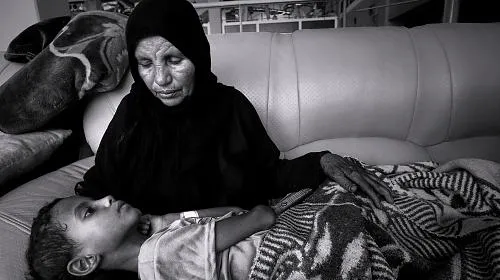SANAA (August 8, 2018) – Sana’a International Airport has been hit with an average of one bomb every two weeks, in the two years since it has been shut to all commercial traffic.
Restrictions imposed on Yemen’s airspace by the Saudi-led coalition led to the official closure of Sana’a International Airport to commercial flights on August 9th 2016. No commercial traffic has since been allowed to access the airport, including to carry Yemenis who need lifesaving medical treatment abroad.
The airport has instead become the site of frequent aerial bombardments. 56 coalition airstrikes have been dropped on the airport complex over the last two years, according to the Yemen Data Project, damaging critical infrastructure and threatening the safety of surrounding communities.
“An airport should be a safe and functioning piece of civilian infrastructure, allowing people to come and go freely,” said Johan Mooij, Country Director for CARE in Yemen. “Instead, the airport in Sana’a has become a symbol of aggression and oppression for a very large population.”
By August 2017, 10,000 Yemenis had died from health conditions for which they were seeking medical treatment abroad, according to the Ministry of Health in Sana’a.
“This war is killing not only by bombs and bullets, but a plethora of illnesses for which people are being denied access to healthcare,” said Mohamed Abdi, Country Director of the Norwegian Refugee Council in Yemen. “Millions of Yemenis now effectively live in an open prison between hostile borders and frontlines of war. As long as the airport is closed, so is the single safe route to lifesaving medical treatment.”
Three years of war have decimated Yemen’s already-fragile health system. Fewer than half of all health facilities are operational. Some 16 million Yemenis need humanitarian assistance to access basic healthcare. Insufficient water infrastructure and high rates of malnutrition have left people extremely vulnerable to disease, including a third wave of cholera.
Over 60,000 people have been killed or injured since the escalation of violence in 2015. Over a million civil servants have not been paid salaries almost two years, causing the slow collapse of public services and swift escalation of the world’s largest humanitarian crisis.
Key facts:
- An estimated 7,000 Yemenis travelled abroad each year for medical care not available in the country, prior to the escalation of the conflict.
- Two of Yemen’s airports remain open to commercial traffic: Aden, in the country’s south coast, and Seiyun, in Hadhramaut governorate. Road travel to each is made difficult by long travel times (up to 12 and 24 hours by road respectively), highly inflated transport costs and having to cross conflict frontlines.
- Some 22 million people – 75 per cent of the total Yemeni population – require some form of humanitarian assistance or protection.
- More than 300,000 Yemenis remain displaced by violence in the last two months alone.
- Around 17 million people are food insecure, including over 400,000 children with suffering from acute malnutrition.
- More than 1 million cases of suspected cholera have been identified since April 2017. The pace of the disease has slowed through 2018, but threatens to return as greater numbers are displaced and lose access to safe water.
About CARE:
Founded in 1945 with the creation of the CARE Package®, CARE is a leading humanitarian organization fighting global poverty. CARE places special focus on working alongside women and girls because, equipped with the proper resources, they have the power to lift whole families and entire communities out of poverty. That’s why women and girls are at the heart of CARE’s community-based efforts to improve education and health, create economic opportunity, respond to emergencies and confront hunger. Last year CARE worked in 93 countries and reached more than 63 million people around the world. Learn more at care.org.
Media contact:
Mahmoud Shabeeb, mshabeeb@care.org, +962-79-146-39-03, Skype: mahmoud.shabeeb_1 (based in Amman, Jordan)
Nicole Harris, nharris@care.org, 404-735-0871

